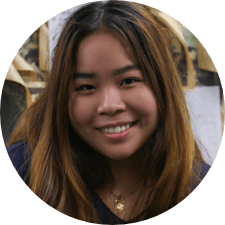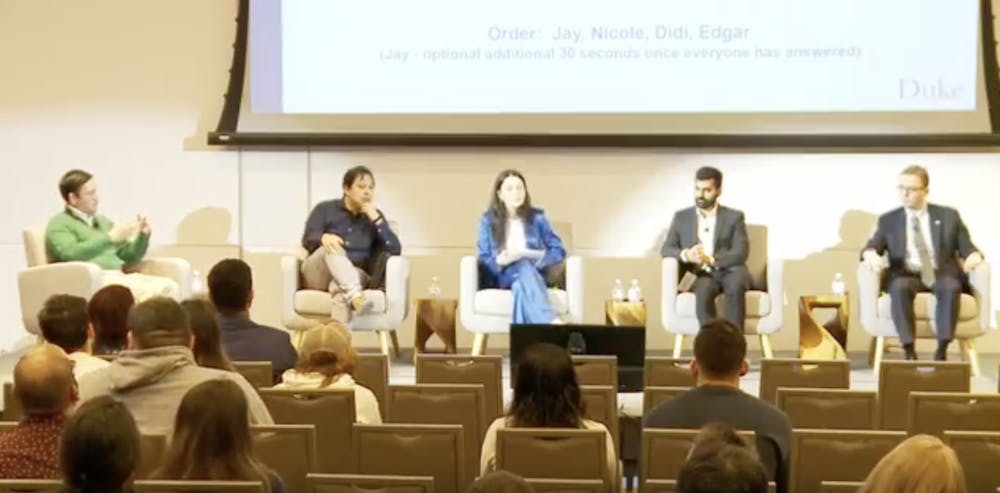The four Graduate/Professional Young Trustee finalists shared their backgrounds and goals for the position with students in a Wednesday open meeting.
Margaret Epps, secretary to the Board of Trustees, explained that the role of Young Trustees is to ensure the Board includes voices of individuals closer to today’s Duke experience.
If elected to the position, a student will serve a three-year term on the Board of Trustees, one year as an observer and two as a voting member of the board, according to Epps. As fiduciaries of the University, Young Trustees “must demonstrate an ability to think broadly about the University, understand the role of the University in society, be curious about institutional issues facing Duke and respect how universities are administered and governed,” Epps said.
An extensive process, beginning with the selection of the Young Trustee Nominating Committee in the fall, resulted in the selection of four finalists: Jay Lusk, an MD-MBA candidate in the Fuqua School of Business and the School of Medicine; Edgar Virgüez, Graduate School ‘22; and Nicole De Brigard and Yedidya “Didi” Yeshurun, both from the Law School.
Christopher Kilner, Graduate/Professional Young Trustee nominating chair and a doctoral candidate in the Nicholas School of Environment, moderated a series of questions for the finalists to answer.
In their initial introductions, the finalists spoke about their backgrounds and how they defined the Young Trustee’s role.
A first-generation American and graduate student from South Florida, De Brigard said that her various backgrounds and life experiences would allow her to “contribute a multifaceted perspective” to the Young Trustee position.
When she came to Duke Law, she tried to make Duke and Durham “feel like home” by joining the Dean’s Advisory Council, and becoming a research assistant, teaching assistant and vice president of the Latin American Law Students Association, among other roles. De Brigard is an intern with the Federal Bureau of Investigation and based in Raleigh. She described her background and these experiences as “all the other hats I’ve worn in my lifetime.”
“All of the understandings and experiences I’ve gained in those hats, bring me to wear that Young Trustee hat,” De Brigard said. She described the role as “being objective, independent and serving as a fiduciary to the University.”
Lusk, who is from Flagstaff, Ariz., described how his experience as a member of Yale-NUS College’s second class of students allowed him to “rethink what a liberal arts institution in a broader research institution [should] look like.”
He has served as president of Duke’s Graduate and Professional Student Government, through which he has engaged with student leaders and senior administrators and served on Trustee task forces. His aim to become a physician and clinician scientist to “create more equitable access to healthy lives for all” aligns with his hope to contribute to Duke’s mission, which he sees is to “make society better for all of us.”
Lusk noted that he sees the Young Trustee as having a “fiduciary obligation” to a range of “stakeholder perspectives,” including faculty, staff, non-administrative staff and undergraduate students.
Born in Colombia to a low-income family, Virgüez described how his mother’s sacrifices for her children taught him that “everytime we had an opportunity, we had to get the most from that.” But his mother also reminded him to “make sure that once we got to those opportunities, we would make a new pathway for others to get to that position,” Virgüez said.
Virgüez has served on 19 committees, councils and boards at Duke, viewing “education as a tool that could change the world.” Virgüez noted that he considers the most pressing questions for the future of Duke’s education to be, “What are we facing in the 21st century that higher education should change?” and “How is Duke going to build a new educational model?”
Yeshurun, who was born and raised in Israel to become a rabbi, came to Duke after studying at the Hebrew University of Jerusalem, where he was part of the student union and was “exposed to the inner makings of higher education.” He noticed how prevalent the sense of community is at Duke, saying “something else is happening here, it’s not just academics.”
He sees the Young Trustee role as a way to “help ensure that this great place endures” and spread Duke’s influence globally, utilizing his public policy experience working at the Israeli Ministry of Justice and Ministry of Finance.
When asked what they thought were the most important takeaways from the pandemic related to higher education, both at Duke and beyond, all the finalists discussed the future of technology and the persistence of human interaction. They also mentioned connections between the University and local, national and global communities, with Virgüez and Yeshurun calling for Duke to consider reforms that help those who have been disproportionately affected by the pandemic.
The finalists were then asked how they have contributed to efforts to eliminate racism and inequality, both at Duke and beyond.
Yeshurun pointed to his time as president of the Hebrew University Student Union, during which he created a mentor program for Black Jewish students and increased admission and retention rates. Virgüez discussed increasing the number of minority faculty and students, also noting his initiative to provide more scholarships to Colombian students to the Nicholas School.
Lusk highlighted his efforts in ending inductions to the Alpha Omega Alpha medical honor society after noticing that non-white students hadn’t been inducted in recent years. De Brigard emphasized that diversity is “not always a numbers game,” highlighting her work with Law School Dean Kerry Abrams to increase diversity efforts past recruitment.
Get The Chronicle straight to your inbox
Sign up for our weekly newsletter. Cancel at any time.
The final question asked finalists how they will prepare for the role of Young Trustee and what skills they will bring as Duke enters a time of rapid social and technological change and long-term challenges. All four answered that they would look to bring in diverse perspectives.
Lusk highlighted diverse student perspectives, while De Brigard emphasized that she would bring in “future-focused risk prevention individuals” to combat Duke’s tendency to “operate under damage control.” Yeshurun mentioned tapping into experts, both at Duke and internationally, to fill gaps in knowledge.
Virgüez pointed to his own unique perspective as a researcher to help Duke “migrate from a University that is investing in climate change research to making sure our actions speak to the same level of commitment” and divesting from fossil fuels.
The finalists ended by highlighting Duke’s impact on either their own lives or society at large. Lusk noted how the University’s decisions have “real implications for the type of society that all of us are going to live in,” while De Brigard promised that she would bring in a “fresh, new and diverse perspective.”
“My wife and I studied here, changed our lives here,” Virgüez said. “Everytime I look at her, I think that Duke has to be one of the best things that happened in my life.”
Students who attended the meeting can share feedback on the finalists for the nominating committee to consider when making their recommendation to President Vincent Price through a survey due March 21. Students who could not attend may watch a recording of the meeting made available on the Board of Trustees website and are also eligible to provide feedback.

Milla Surjadi is a Trinity junior and a diversity, equity and inclusion coordinator of The Chronicle's 119th volume. She was previously editor-in-chief for Volume 118.

